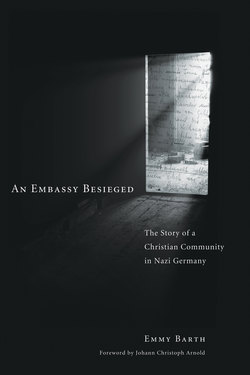Читать книгу An Embassy Besieged - Emmy Barth - Страница 6
На сайте Литреса книга снята с продажи.
Foreword
ОглавлениеHere published for the first time is the story of my grandfather’s resistance to National Socialism. My parents were young adults when Hitler came to power, and I grew up hearing the story from them. They both experienced the Gestapo raid of the community my grandfather founded after refusing to vote for Hitler in the plebiscite of November 1933. My father was lined up against the wall with other young men and thought they would all be shot. My parents’ wedding took place hurriedly two years later so that they could use their “honeymoon” to escape the military draft by fleeing to England.
The Gestapo would come again, and this time they told the community that they had only twenty-four hours to pack up and leave. Community members could take only what they could carry on their backs. It was April and the community lived in the Rhön mountains where it was terribly cold and windy. There were many little babies, mothers and children. Several young men, including my father-in-law, were put into a Nazi prison. He never expected to come out alive, but by the grace of God he did. In fact, all of us safely escaped Nazi Germany.
We eventually made our way to England and then several years later, right during the war, we were forced to emigrate to South America. I was six months old when my parents risked a voyage across the submarine-infested Atlantic to the jungles of Paraguay. It was in these conditions that I grew up, and it was clear to me from childhood on that radical discipleship would mean suffering for my faith.
I have lived for more than fifty years in the United States, where the Bruderhof Communities have been allowed to live in peace. For this I am very grateful. But I am also very worried about what is happening in our country today. We are living in a culture of death, where euthanasia, capital punishment, abortion, physician-assisted suicide, and on-going military action are a mainstay of everyday life. We don’t know where it will end!
There have been dramatic political and economic shifts as well. The level of frustration, anger, and fear combined with an ever-increasing rhetoric of hate and blame remind me a lot of the 1920s and 30s in Germany. We hear rumors of war, and governments on both sides of the Atlantic encroach on religious liberties, making it more and more difficult to live as true disciples of Jesus.
This brings me back to my grandfather. Engraved on his tombstone is the following verse from Revelations: “Blessed are the dead who die in the Lord henceforth . . . They may rest from their labors, for their deeds follow them.” This epitaph seems particularly fitting when viewed through the lens of history. He died seventy-five years ago. Yet, while Hitler’s “Thousand Year Reich” crumbled in defeat after a mere twelve years, the Bruderhof movement continues to flourish. More than that, however, my grandfather’s prophetic vision speaks right into our situation and the questions that face society today.
I am struck by his literal understanding of the words of Jesus in the Sermon on the Mount: “Love your enemy. Pray for those who persecute you.” My grandfather rejected power politics on the one hand but also spiritual quietism on the other. He practiced the politics of love: “You can love a man only when you have understood what is living in him,” he told his community. “We have to find an inner understanding with the Nazis, and then we have to represent to them the politics of the kingdom of Jesus Christ. After coming to a heart-to-heart exchange with them, when we confront them with the policy of the coming kingdom of God, we are going to collide sharply with them.”
My grandfather died shortly before the Bruderhof was forced to leave Germany. He knew it was only a matter of time, yet he never gave up hope that even Hitler could be reached by God’s love. In a personal letter to Adolf Hitler in November 1933, he addressed him as “Our beloved Reichskanzler Adolf Hitler.” He expressed his respect for Hitler’s “God-given task of government” and pleaded with him to spare the innocent. He ended his letter: “We ask God from our hearts that at God’s hour [our beloved Reichskanzler] may become, instead of an historical instrument of supreme state authority, an ambassador of the humiliated Christ, to whom alone it was given to reveal the perfect love of God’s heart.”
The greatest enemy of our country today is the polarizing forces of hate and violence that feed off the apathetic indifference of self-satisfied people. As the vanguard and embassy of God’s kingdom, the church is called to show that only radical love can overcome the bankruptcy of these two extremes. Here is a story that demonstrates in very concrete terms what this love entails, why it matters, and why it cannot be defeated. May it inspire us, especially those who confess Jesus as Lord, but more importantly, may it move us to act while there is still time.
Johann Christoph Arnold
June 2010
